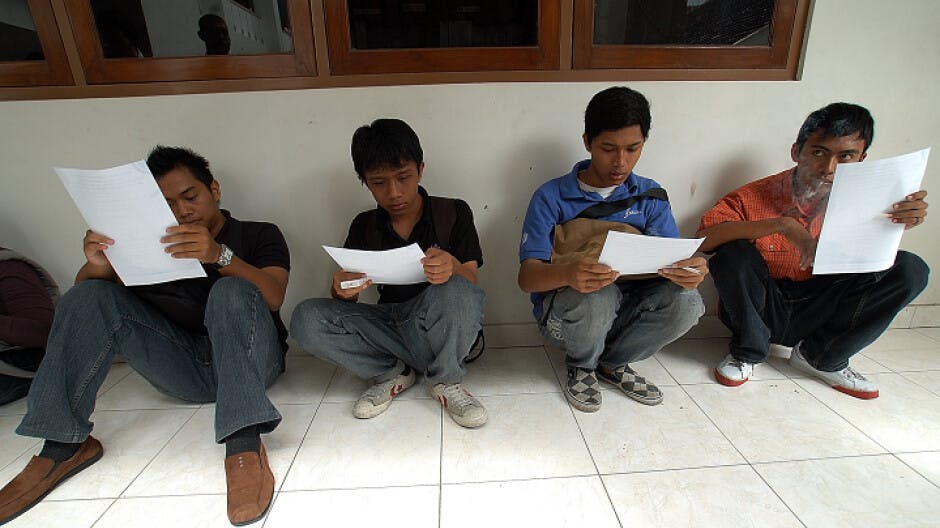一知半解最危險
A little learning is a dangerous thing 一知半解最危險,因為略有知識的人往往不自覺無知,很容易被不真實的言論欺騙。
Learn 跟 study 的意思相近,但用途廣泛得多。
Study 的涵義比較清晰和確切,不外乎兩個:1. 學習;用功,to look at, read, or listen to something in order to learn。2. 研究;注意看;仔細端詳,to examine carefully。A quick study 卻可以指一個人,例如:He’s a quick study and he easily grasps all the details of a discussion 便是指這個人的學習能力很高,很快掌握到問題的核心:he is able to learn things quickly. A quick study is one who is able to memorize something easily and quickly or is able to understand and deal with something easily and successfully.
Learn 的涵義,最少有三個:
1. 學習 to gain knowledge or skill:You’ll take time to learn the ropes. You learn the ropes means you learn the details and the procedure of a craft; you are thoroughly familiar with a particular situation. 例如你學習一門工藝,學曉做法的過程,the ropes of a business or trade;你掌握竅門,學會基本的技巧和要領,慢慢熟悉某個行業的操作。這句習用語,源自帆船上的水手,他們需要學會怎樣擺弄好桅繩,如何操縱由桅繩製成的種種複雜索具,往往需要累積經驗。
2. 記住 to fix in the memory;例如:learn by heart 記住、背誦出來,you learn so thoroughly that you can repeat from memory; you memorize something, so that it can be instantly recalled. Children had to learn their mathematical tables by heart,中國的小朋友,從小需要背誦乘數表;我們假如能夠背誦一些唐詩宋詞,對語文會很有幫助,一生受用。When we were at school, we had to learn a poem by heart every week.
3. 得悉 to become informed:His father learnt in the newspapers of his son’s success in sports 他的父親從報章得悉兒子在體育上的成就。
活到老,學到老
Learn 的習用語還有:learn a lesson/learn one’s lesson 汲取教訓,often after a mistake,通常指在一次不幸事件或犯了錯誤之後,知道下次應該怎樣做,或者曉得不去幹。You live and learn 活到老,學到老:you gain useful experience with age; you learn through experience. You learn something the hard way: you learn something through your own bitter experience 通過自己的痛苦經驗而學到的東西。
Know 的習用語更多更廣泛,其熱門例子如下:
know a thing or two 明白事理,精明能幹;
know all answers 萬事通,什麼都知道;
know one’s stuff 很內行;
know somebody through and through 徹頭徹尾認識某人;
know what one is talking about 學識淵博,知識豐富;
know a man by his company 從其交友,可判斷其為人;
know something backwards and forwards 對某件事情 知道得很多;
know something inside and out 對某事透徹暸解;
know something like the back of your hand 對某事瞭如指掌。
已知的危苦比未知的好
還有一句很有趣的諺語:better the devil you know than the devil you don’t,這句話有不同的詮釋,便有不同的翻譯。知道的壞事或壞人比不知道的好:it is better to deal with a person or thing you know, even if you do not like them, than to deal with a new person or thing who could be even worse,例如:I know my boss can be difficult to work with sometimes, but better the devil you know. 諺語中的 devil 可以解作危險 danger 和困苦 hardship,所以也有人這樣翻譯:已知的危苦比未知的好;所謂明槍易躲,暗箭難防,例如;一個怕暈船的人,寧願坐船而不坐飛機,因為暈船的痛苦,他早已體驗過了,坐飛機難以忍受的滋味,卻是未知數。
Knowledge 作為 know 的名詞,有幾個意思:
1. 知識、學問、學識 learning;that which is known,例如:medical/scientific/practical knowledge 醫學、科學、實用知識。Knowledge is power 知識就是力量。
2. 了解 understanding;the condition of knowing,例如:He has little knowledge of the facts 對於事實的真相,他了解得很少。
3. 熟悉 familiarity with;information about something,例如:He has a good knowledge of Vancouver 他對温哥華這個地方很熟悉。
經常用到的 knowledge idiomatic expressions 有:
come to someone’s knowledge 被某人發現;
to my knowledge/to the best of my knowledge 據我所知;
without my knowledge 我毫不知情。
常見的搭配 knowledge collocations 有:common/general/wide/extensive/basic/full/expert/specialized/intimate/profound knowledge。
本專欄逢周二、五發表






































